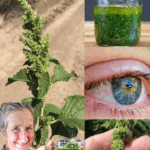For seniors over 50 looking to boost their health naturally, pigweed—also known as amaranth—is a nutrient-packed leafy green that deserves a place in your diet. This often-overlooked superfood is rich in vitamins, minerals, and antioxidants that support everything from strong bones to a healthy heart. Perfect for health-conscious retirees, pigweed is easy to prepare and budget-friendly, making it ideal for senior wellness. Discover six science-backed benefits of pigweed and learn simple ways to add it to your meals for a vibrant, healthy life.

What Is Pigweed?
Pigweed, or Amaranthus, is a leafy green vegetable celebrated in many cultures for its nutritional value. Packed with vitamins A, C, and K, plus minerals like calcium, iron, and potassium, it’s a powerhouse for seniors aiming to stay active and healthy. Unlike trendy greens, pigweed is affordable and often grows wild, making it accessible for retirees who may not be tech-savvy. Its versatility in cooking—from salads to soups—makes it a practical choice for senior wellness, supporting overall health naturally, per WebMD.
Boosts Bone Health
Strong bones are crucial for seniors to maintain mobility and prevent fractures, and pigweed’s nutrients can help.
- Calcium: Supports bone density, per the National Institutes of Health.
- Vitamin K: Enhances bone mineralization, per a 2018 study in Journal of Bone and Mineral Research.
- Magnesium: Aids calcium absorption, per Mayo Clinic.
How to use:
- Add 1 cup of chopped pigweed to soups or stews for a bone-strengthening meal.
- Sauté with olive oil as a side dish 2–3 times weekly.
Tip: Pair with vitamin D-rich foods like eggs for better absorption, per Harvard Health.

Supports Heart Health
Heart health is a priority for seniors, and pigweed’s nutrients promote cardiovascular wellness.
- Potassium: Helps regulate blood pressure, per the American Heart Association.
- Antioxidants: Betalains reduce inflammation linked to heart disease, per a 2019 study in Nutrients.
- Iron: Supports healthy blood circulation, per WebMD.
How to use:
- Toss fresh pigweed leaves into a salad with heart-healthy avocado.
- Blend into a smoothie with berries for a daily heart boost.
Tip: Use organic pigweed to avoid pesticides, available at farmers’ markets, per the CDC.
Enhances Digestive Health
Digestive issues like constipation can affect seniors, but pigweed’s fiber content supports a healthy gut.
- High fiber: Promotes regular bowel movements, per Mayo Clinic.
- Balances microbiome: Supports beneficial gut bacteria, per a 2020 study in Frontiers in Microbiology.
- Aids nutrient absorption: Improves overall digestion, per Harvard Health.
How to use:
- Steam 1 cup of pigweed as a side dish for dinner.
- Add to a vegetable smoothie with carrots for a fiber-rich drink.
Tip: Start with small portions to ensure digestive comfort, per the National Institute on Aging.

Strengthens Immunity
A robust immune system helps seniors stay healthy, and pigweed’s nutrients provide natural support.
- Vitamin C: Boosts white blood cell production, per a 2017 study in Nutrients.
- Beta-carotene: Strengthens skin as a first defense, per WebMD.
- Antioxidants: Protect against infections, per the American Journal of Clinical Nutrition.
How to use:
- Brew pigweed tea (1 tsp dried leaves in hot water) and drink daily.
- Add fresh leaves to omelets for an immune-boosting breakfast.
Tip: Store dried pigweed in an airtight container for year-round use, per Gardening Know How.
Promotes Skin Health
Healthy skin keeps seniors looking and feeling vibrant, and pigweed’s vitamins support a youthful glow.
- Vitamin A: Enhances skin repair, per a 2018 study in Dermatology Reports.
- Vitamin C: Supports collagen production, per Harvard Health.
- Antioxidants: Reduce oxidative stress, per WebMD.
How to use:
- Blend pigweed into a smoothie with citrus fruits for skin benefits.
- Add to salads with olive oil to enhance nutrient absorption, per Mayo Clinic.
Tip: Eat raw or lightly cooked to preserve vitamins, per the CDC.
Reduces Oxidative Stress
Oxidative stress can accelerate aging and disease, but pigweed’s antioxidants help seniors stay resilient.
- Betalains: Neutralize free radicals, per a 2019 study in Antioxidants.
- Phenolic compounds: Lower inflammation, per the Journal of Agricultural and Food Chemistry.
- Supports longevity: Protects cells from damage, per Harvard Health.
How to use:
- Mix pigweed into stir-fries with garlic for an antioxidant-packed meal.
- Drink a pigweed smoothie 3–4 times weekly for consistent benefits.
Tip: Combine with other greens like spinach for added antioxidant power, per WebMD.
CTA: Share this superfood tip with a friend who loves healthy eating!
How to Add Pigweed to Your Routine
Seniors can easily incorporate pigweed into their daily meals with these simple ideas:
- Breakfast: Add ½ cup chopped pigweed to scrambled eggs or a smoothie.
- Lunch: Toss 1 cup fresh pigweed into a salad with nuts and a light dressing.
- Dinner: Steam or sauté pigweed as a side dish with lean protein like fish.
- Snack: Brew pigweed tea for a soothing, nutrient-rich drink.
Tips for success:
- Start with small portions (½ cup) to test tolerance, per the National Institute on Aging.
- Use fresh pigweed for maximum nutrients; find it at farmers’ markets or grow it at home, per Gardening Know How.
- Wash thoroughly to remove dirt or pesticides, per the CDC.
- Store fresh pigweed in the fridge for up to 5 days, wrapped in a damp cloth, per WebMD.
- Pair with regular exercise and hydration for overall senior wellness, per Harvard Health.
Safety precautions:
- Consult your doctor if you have kidney issues, as pigweed contains oxalates that may affect some conditions, per Mayo Clinic.
- Avoid if allergic to amaranth or related plants, per WebMD.
- Do not consume pigweed from areas treated with pesticides, per the EPA.
- Seek medical advice for persistent health concerns, per the CDC.

Complementary Lifestyle Tips
To maximize pigweed’s benefits, adopt these habits:
- Stay active: Walk 20–30 minutes daily to support circulation, per the American Heart Association.
- Eat a balanced diet: Include fruits, whole grains, and lean proteins, per the CDC.
- Drink water: Aim for 8 glasses daily to aid digestion, per Mayo Clinic.
- Get enough sleep: 7–8 hours nightly supports immunity, per the National Institute on Aging.
Why it’s senior-friendly:
- Affordable: Pigweed is inexpensive or can be foraged/grown.
- Simple: Easy to cook or eat raw, ideal for retirees.
- Versatile: Fits into various dishes, per WebMD.
Frequency:
- Consume ½–1 cup of pigweed 3–5 times weekly for 2–4 weeks to notice benefits.
- Maintain long-term with regular use, adjusting based on dietary needs, per Harvard Health.
Conclusion
Pigweed is a nutrient-rich superfood that supports senior wellness with benefits like stronger bones, better digestion, and a healthier heart. Its vitamins, minerals, and antioxidants make it a simple, natural addition to a health-conscious lifestyle for seniors over 50. Try adding pigweed to your meals today to feel more vibrant and energized. Explore more health tips on our site to keep thriving!









